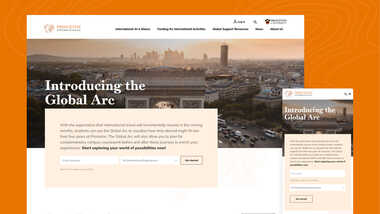This Fall, Evolving Web was recognized by Acquia as a Leader of the Pack in Higher Education for a project in partnership with Princeton University. We received the Acquia Engage award in Miami on Oct 26, 2022, where we also got a chance to learn about all the latest from Acquia with fellow partners and colleagues across the Drupal community.
Acquia Engage is an unmissable industry event for partners, customers, prospects, and thought leaders, and this year was no exception. In this article, I’ll share some of the trends that we’ve been seeing recently in the Acquia ecosystem, and in our own projects like the award-winning website we built for Princeton International.
Our Winning Project: An Immersive Website for Students Planning to Study Abroad
The Princeton International website is the product of our partnership with Princeton University to build a site geared toward students looking to study abroad. The interactive, intuitive itinerary-building interface allows students to select their international programs and create a unique curriculum incorporating both their international and on-campus studies.
The website’s single most innovative feature is the Global Arc. This interactive, intuitive itinerary-building interface allows students to select their international programs and build a unique curriculum incorporating both their international and on-campus studies, while also enabling them to add to their planning section and prioritize curriculum choices, generate a detailed timeline of their desired courses and engage with the Princeton Global Programs System (GPS) and Princeton course catalogue, all by way of a single sign-on.
Imagine it like a tool that helps you plan your trip. You can select your destination country, your dates and the places you want to visit. The tool maps out a suitable itinerary for you, tells you how much money you will need to bring and tells you if any help is available. Need a visa? All the details attached to your profile are available by logging in.

“Every single Engage Award submission was ambitious and the combined experiences have touched billions of lives around the world—proving that an open web experience is the best kind of experience.” Baddy Sonja Breidert, Chair of the Drupal Association Board of Directors
The Global Arc uses a decoupled architecture, built on Drupal 9 linked to a React front-end, to prevent heavy database requests.
Industry Trends to Watch
Speaking of decoupled architecture, it was one of the main industry trends to watch alongside, personalisation, digital assets and data management. Princeton International, our winning project is leading some of these trends in the higher education industry.
Headless
What is headless technology you may ask? You can read more about headless and hybrid content management systems in this recent blog post but in short, headless technology is when the frontend web experience is separated from the back end; the two communicate through an API (application interface).
This technology allows organisation to collect and distribute content through as many channels as they need. In the case of Princeton International, we used this technology to pull the latest data about the university programs, news, international experiences, and country risk levels to the new website from different external data sources. We built Global Arc's front-end with React, while other pages of the website use a standard Drupal front-end approach. Using React selectively prevents the slowness caused by heavy database requests on interactive pages, without the overhead of creating an entirely decoupled application. This hybrid approach between JavaScript and Drupal is ideal for managing large amounts of content and pushing the limits of interaction design.
Drupal currently offers the freedom and flexibility to pair with other types of frontend technologies like ReactJS and NextJS and has been pushing the concept of the Assembled Web for more than 10 years now.
Personalisation, in the Era of Data Privacy
Another hot topic at Acquia Engage was how to unify data and content to deliver personalized experiences. A timely conversation as many users are asking for more clarity about the use of their digital data. Secure personalization was in fact one of the key components in the Princeton International project. Users needed to be able to plan their study itinerary, including curriculum requirements, and share this information while preserving user privacy.
Discussions revolved around best practices to maintain users’ trust and allow them to share their preferences while keeping control of their data. As we prepare for a cookieless future, the issue of data collection to deliver unique digital experiences will continue to be a hot topic of discussion.
Drupal 10 Readiness
With Drupal 10 coming in December, Drupal readiness was also a hot topic. The release date is coming fast and we’re hosting a webinar on D10 to help you learn about its exciting new features and what they mean for teams managing Drupal sites. Register today or send us your questions using our contact form

